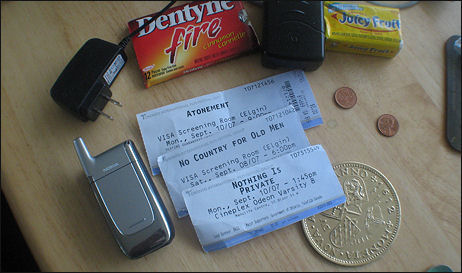
Day: September 14, 2007
Cigarette smoke reeks
My suspension of disbelief falls apart whenever anyone in a movie lights up indoors. This always makes me shift in my seat and say to myself, “Jeez, now the place is going to reek of cigarette smoke…why doesn’t the guy go outside or at least open a window?” And I really can’t stand it when a character lights up inside a car without opening the windows because you can always smell it the next day and the day after, even if it was only one person smoking a single cigarette, and it’s always rancid and repulsive.
Scared of DePalma
“I had a few too many vodka and sodas, and I’m feeling it,” confides a friend who’s just gotten back from the Toronto Film Festival. “Perhaps it’s better in the end, but I didn’t see Battle for Haditha or Redacted. Oliver Stone recently said that the Iraq conflict was ‘another generation’s war‘ as he preps for Pinkville. I think he’s right to stay with what he knows, and for this reason Brian DePalma‘s Redacted scares me a little. Iraq may prove to be very complex to bring to the big screen and an even bigger marketing challenge. I wouldn’t want to be Mark Cuban right now, although it sounds like Haditha has some fans.”
Del Toro, Che & Rolling Stones
In describing the currently-shooting Che Guevara films — The Argentine and Guerilla — in the October 2007 Esquire, Benicio del Toro, obviously a big Rolling Stones fan, tells profiler Chris Jones that “we’re trying not to do Che’s greatest hits.” And then he explains what that means.
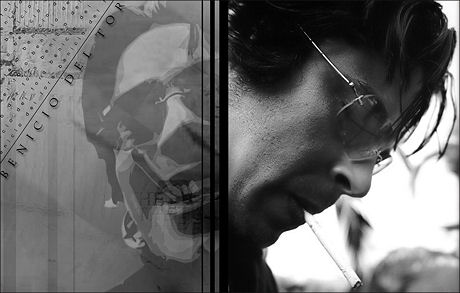
“If you’re doing a greatest hits of the Rolling Stones, you probably open up with ‘Satisfaction’ and then you finish the first side of the album with ‘Sympathy for the Devil,'” Del Toro begins. “And then you open side two with ‘Gimme Shelter’ and you close with ‘Start Me Up.’ Well, we’re trying to start with ‘Blue Turns to Grey’ and finish with ‘Stray Cat Blues,’ and then start the second side with ‘Luxury’ and finish it with ‘Infamy’….something like that.”
In my April ’07 piece on Peter Buchman‘s two Che screenplays, I called The Argentine “political and terse and rugged…about how living outside the law and fighting a violent revolution feels and smells and chafes on a verite, chapter-by- chapter basis. They’re about sweat and guns and hunger and toughing it out… friendships, betrayals, exhaustion, shoot-outs and trudging through the jungle with a bad case of asthma. What it was, how it went down…the straight dope and no overt ‘drama.'”
Steven Soderbergh is currently directing the films in Spain. They’re expected to open next year with weeks of each other, although I don’t know what season. Early to mid fall is my guess — I haven’t made the calls.
Toronto Sum-Up, Part 1
So what exactly happened at the Toronto Film Festival? Which films surged, died, took blows, and moderately gained or lost momentum? Sitting here at the Starbucks on Yorkville and possessed of nothing paralyzing in terms of insight or wind-sensing, here’s how the post-Toronto, award-level situation seems to be shaping up to me.
The biggest winner hands down was Sidney Lumet‘s Before The Devil Knows You’re Dead, which had little or nothing in the way of headwind coming in and is now regarded by every critic I’ve spoken to so far as one of the year’s absolute best, and by some (myself included) as a Best Picture contender. Costar Phillip Seymour Hoffman is, I feel, an undeniable Best Supporting Actor contender off of this.
The second biggest winner (in my eyes, at least) was Joe Wright‘s Atonement. I’ll be flabbergasted if it doesn’t end up a Best Picture nominee, and it seems nearly certain that a Best Supporting Actress nom is Vanessa Redgrave‘s for the taking.
Todd Haynes‘ I’m Not There, Sean Penn‘s Into The Wind, Anton Corbijn‘s Control, Andrew Dominik‘s The Assassination of Jesse James and Tony Gilroy‘s Michael Clayton received the third, fourth, fifth, sixth and seventh biggest success d’estime bumps.
The Coen brothers‘ No Country for Old Men held its own and then some. Anyone who knows anything recognizes this film as a landmark achievement, and perhaps the greatest mainstream art film built upon chases and killings and societal degradation ever made. I spoke to one major Midwestern critic who said he didn’t care for it all that much, but no one else was murmuring stuff along these lines.
Although Paul Haggis‘s In The Valley of Elah did well with a clear majority of critics (it’s currently hovering around 60% positive on Rotten Tomatoes) while bombing out with a few, I started to get an idea that it’s going to play even better with paying audiences and Academy members. The great Tommy Lee Jones‘ performance as a sad, confused father of a murdered Iraq War veteran is the ace in the hole.
Elizabeth: The Golden Age was the biggest crash-and-burn. It came in a presumptive Best Picture contender, and is now regarded as a film that may play commercially (no guesses ventured but some people go nuts for this kind of thing) and may snag a few tech nominations (costumes, production design) but that’s all.
The second biggest “damage” movie was Alan Ball‘s Nothing Is Private. I don’t agree with the neg-heads at all — I think it’s a strong, well-written, provocative drama with good characters. I understand why everyone was so upset, but I don’t think they’re fully considering the source (Alicia Erian‘s “Towelhead”) or giving the credit that Ball is due for handling the sexual stuff with restraint.
Jason Reitman‘s Juno kept its Telluride Film Festival momentum rolling, but the handicappers I spoke to seemed more respectful and moderately approving than elated or given to cartwheel orgasms.
Noah Baumbach‘s Margot at the Wedding deserves points for being a Chekhov play about a group of deeply fucked-up egotists who possess almost no redeeming characteristics, and for throwing in almost nothing that soothes or charms or mollifies except for the occasional laugh (of which there are relatively few). I truly respect Baumbach for playing it this way — he’s a ballsy director — but the fact is that it’s a fairly dislikable film in more ways than you can count. Almost everyone I spoke to felt this way, but it’s a film you have to at least respect.
Ang Lee‘s Lust, Caution played decently. My sense is that it’s a respected film. Nobody I spoke to slammed it with any fervor. It’s more of a double than a home run, but you can’t hit it into the bleachers every time.
George Romero‘s Diary of the Dead picked up mild buzz, but I heard some disses as well. I missed my last shot at seeing it last night, but a major L.A. critic said it has Iraq War echoes and metaphors that makes it arguably analagous to Brian DePalma‘s Redacted (which I never got around to seeing either) and Nick Broomfield‘s Battle for Haditha — neither of which seemed to gather huge fan bases.
Julie Taymor‘s Across The Universe was seen as a total wipe out. More than any other emotion or judgment or what-have-you, the thing it leaves you with is the question “why?” As in why was this made and who cares? One good thing: the high school-age lesbian singing “I Want To Hold Your Hand” at a slow, steady tempo to a girl playing soccer nearby during gym class.
Sorry to be the bearer, but Terry George‘s Reservation Road didn’t seem to turn anyone on very much. It kind of fizzled, truth be told.
I didn’t see Lars and the Real Girl, but the universal consensus was that Ryan Gosling had added another notch to his cool-Brandoish-actor belt.
And Cate Blanchett emerged with serious Best Actress (or Best Supporting Actress) momentum for her I’m Not There performance as Bob Dylan.
I’ll run a Part Two on this piece later tonight or tomorrow, as it’s obviously incomplete. If anyone has any detections or assessments they feel should be added, please feel ree.
Lumet at the Intercontinental
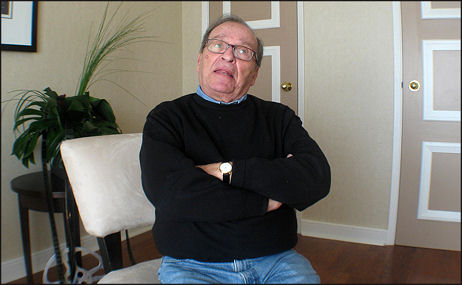
Before The Devil Knows You’re Dead director Sidney Lumet during a 13-minute quickie at Toronto’s Intercontinental Hotel — Friday, 9.14.07, 1:25 pm. (The audio interview won’t be up until tonight due to my having left the Olympus digital recorder connector cord back at the pad…excuses, excuses.)
Malick/Zoolander
An age-old maxim — “Never trust the artist, trust the tale” — has been underlined in a Seth Rogen interview with the Guardian‘s John Patterson, in which Rogen drops a Terrence Malick bombshell. Besides having directed Rogen in Pineapple Express, David Gordon Green is “good friends” with the reclusive semi-oddball director, says Rogen.
“And David said to me the other day, ‘Guess what Terrence Malick’s favorite movie of the last 10 years is?'” Okay, what? “Zoolander! He knows every word, watches it every week. Which just goes to show, you never can predict these things.” Are you hearing this, Oliver Stone? Does Ben Stiller have an official response he’d like to pass along? Malick/Zoolander, Malick/Zoolander, Malick/Zoolander…an amusing attitude-trip film that, for me, was a little bit better as a script.
“Joy Division” acquired
A few hours after Variety‘s Robert Koehler suggested that Harvey Weinstein acquire Grant Gee‘s Joy Division doc so he can include it with Anton Corbijn‘s Control (a Weinstein Co. release) on a double-disc DVD, Weinstein did exactly that. (For what it’s worth, I urged this action yesterday also.)
“I feel…good.”
The only substantive thing I’ve said about The Brave One is that it’s better than Michael Winner‘s Death Wish, which sounds like damnation with faint praise. But it really is better crafted, more emotionally supple (it’s truly a vigilante film made to appeal to sensitive older women) and more highly polished — a smarter, more fully considered A-level studio film compared to the bordering-on-exploitation crudeness that went into Winner’s.
That said, Death Wish has a much better ending — i.e., Bronson eyeballing some street hooligans as he arrives in Chicago (having been ordered to leave Manhattan by the NYPD), and then forming a pistol with his thumb and forefinger and pretending to take them out, and faintly grinning as he does this. (I won’t spoil The Brave One‘s ending, but it absolutely doesn’t fly.)
And The Brave One doesn’t have a moment as satisfying as the one in which Bronson, having shot two or three street malignants, is asked by an office colleague (or is it his son-in-law?) how he’s feeling, and he says in a mellow nonchalant way, “I feel…..good.”
“Death Wish” vs. “Brave One”
“The seminal vigilante film of the era — or any era — is Michael Winner‘s Death Wish (1974),” writes Slate‘s Eric Lichtenfeld. “Based on Brian Garfield‘s novel, the movie immortalized Charles Bronson as Paul Kersey, an everyman who responds to the brutalization of his wife and daughter by obsessively smiting muggers and other ‘freaks’ (as the credits bill his family’s attackers).
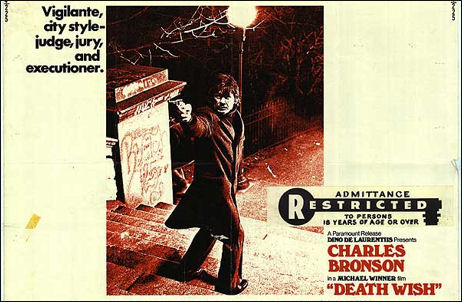
“This is far from where Kersey began: a progressive raised to hate guns, and a wartime conscientious objector. Of course, Kersey’s liberalism exists only so it can be corrected later. Liberals are similarly ‘reformed’ in the new Jodie Foster movie, The Brave One, as well as in Vigilante, Death Wish 3 and The Enforcer, in which a cop’s widow makes the point, ‘It’s a war, isn’t it? I guess I never really understood that.'”
Tapley “Devil”
Before the Devil Knows You’re Dead “is one of the best films of the year if only because it does so much with so little,” writes In Contention‘s Kris Tapley. “The story is conveyed in a broken narrative fashion that seems unnecessary at first, but [this] choice oddly enlightens the viewer to the inner workings of the characters at a deliberate and particular pace, allowing for a certain marinating quality. That Lumet is still knocking stuff like this out of the park at his age is becoming almost an expected fact, but there is something special working within the frames of this picture. You just don’t come across a filmmaker able to drill this deep anymore.”
Ebert on “Dead”
“Sidney Lumet, at 83, may be the oldest director with a film at Toronto this year,” Roger Ebert has written, “but his films are always sharp-edged and constructed with a taut urgency, and now he has made a crime film as good, in its own way, as his Dog Day Afternoon, The Verdict, Find Me Guilty and Serpico.
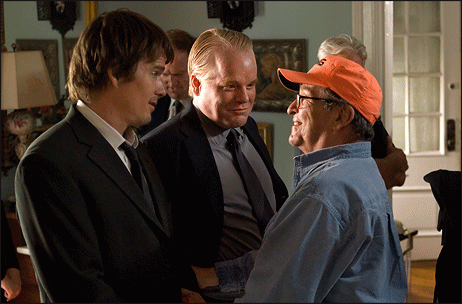
Ethan Hawke, Phillip Seymour Hoffman, Sidney Lumet on set of Before the Devil Knows You’re Dead.
“Like those films, like all of his crime films, Before the Devil Knows You’re Dead shakes off the conventions of genre and becomes a study of character. It uses, as Lumet likes to do, superb actors: Philip Seymour Hoffman and Ethan Hawke as brothers, Albert Finney as their father, Marisa Tomei as Hoffman’s wife, Rosemary Harris as Finney’s wife, and Amy Ryan as Hawke’s ex-wife.
“The brothers both face financial emergencies, and Hoffman concocts a plan to stick up their family’s suburban jewelry store on a Saturday morning, when the staff will be one old lady. His plan: No guns, no muss, no fuss, dad gets reimbursed by insurance, nobody’s a loser, and their problems are over.
“The plan does not quite work out. Kelly Masterson‘s screenplay (her first) uses interlocking flashbacks to see the plan and the problems gradually swelling toward critical mass. And what is so good about the film is the depth of the characters, of the brothers (one nursing old wounds, the other feckless), the father (Finney sounds the depths of the man’s soul) and Tomei (whose marriage is coming apart and she doesn’t know why).
“Lumet started in TV in 1951. His career directing feature films began with the masterpiece 12 Angry Men (1957), and he hasn’t lost one beat in 50 years.”
But Lumet has lost the beat from time to time. The ’90s were not a good period for him — Gloria (’99), Critical Care (’97), Night Falls on Manhattan (’97), Guilty as Sin (’93) and A Stranger Among Us (’92) were all problem films. Q & A — which came out 17 years ago — was the last truly decent Lumet film until Find Me Gulity came along in ’06. And now Before the Devil Knows You’re Dead, a better film than Find Me Gulity (which is saying a lot) and Lumet’s best since Prince of the City.
